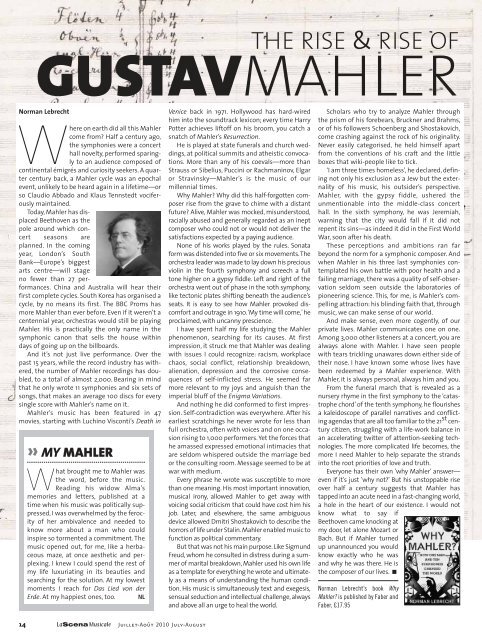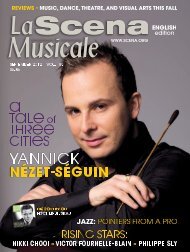Adobe Acrobat PDF complet / complete (7.5 Meg) - La Scena Musicale
Adobe Acrobat PDF complet / complete (7.5 Meg) - La Scena Musicale
Adobe Acrobat PDF complet / complete (7.5 Meg) - La Scena Musicale
You also want an ePaper? Increase the reach of your titles
YUMPU automatically turns print PDFs into web optimized ePapers that Google loves.
THE RISE & RISE OF<br />
GUSTAVMAHLER<br />
Norman Lebrecht<br />
Where on earth did all this Mahler<br />
come from? Half a century ago,<br />
the symphonies were a concert<br />
hall novelty, performed sparingly<br />
to an audience composed of<br />
continental émigrés and curiosity seekers. A quarter<br />
century back, a Mahler cycle was an epochal<br />
event, unlikely to be heard again in a lifetime—or<br />
so Claudio Abbado and Klaus Tennstedt vociferously<br />
maintained.<br />
Today, Mahler has displaced<br />
Beethoven as the<br />
pole around which concert<br />
seasons are<br />
planned. In the coming<br />
year, London’s South<br />
Bank—Europe’s biggest<br />
arts centre—will stage<br />
no fewer than 27 performances.<br />
China and Australia will hear their<br />
first <strong>complet</strong>e cycles. South Korea has organised a<br />
cycle, by no means its first. The BBC Proms has<br />
more Mahler than ever before. Even if it weren’t a<br />
centennial year, orchestras would still be playing<br />
Mahler. His is practically the only name in the<br />
symphonic canon that sells the house within<br />
days of going up on the billboards.<br />
And it’s not just live performance. Over the<br />
past 15 years, while the record industry has withered,<br />
the number of Mahler recordings has doubled,<br />
to a total of almost 2,000. Bearing in mind<br />
that he only wrote 11 symphonies and six sets of<br />
songs, that makes an average 100 discs for every<br />
single score with Mahler’s name on it.<br />
Mahler’s music has been featured in 47<br />
movies, starting with Luchino Visconti’s Death in<br />
» MY MAHLER<br />
What brought me to Mahler was<br />
the word, before the music.<br />
Reading his widow Alma’s<br />
memories and letters, published at a<br />
time when his music was politically suppressed,<br />
I was overwhelmed by the ferocity<br />
of her ambivalence and needed to<br />
know more about a man who could<br />
inspire so tormented a commitment. The<br />
music opened out, for me, like a herbaceous<br />
maze, at once aesthetic and perplexing.<br />
I knew I could spend the rest of<br />
my life luxuriating in its beauties and<br />
searching for the solution. At my lowest<br />
moments I reach for Das Lied von der<br />
Erde. At my happiest ones, too. NL<br />
Venice back in 1971. Hollywood has hard-wired<br />
him into the soundtrack lexicon; every time Harry<br />
Potter achieves liftoff on his broom, you catch a<br />
snatch of Mahler’s Resurrection.<br />
He is played at state funerals and church weddings,<br />
at political summits and atheistic convocations.<br />
More than any of his coevals—more than<br />
Strauss or Sibelius, Puccini or Rachmaninov, Elgar<br />
or Stravinsky—Mahler’s is the music of our<br />
millennial times.<br />
Why Mahler? Why did this half-forgotten composer<br />
rise from the grave to chime with a distant<br />
future? Alive, Mahler was mocked, misunderstood,<br />
racially abused and generally regarded as an inept<br />
composer who could not or would not deliver the<br />
satisfactions expected by a paying audience.<br />
None of his works played by the rules. Sonata<br />
form was distended into five or six movements.The<br />
orchestra leader was made to lay down his precious<br />
violin in the fourth symphony and screech a full<br />
tone higher on a gypsy fiddle. Left and right of the<br />
orchestra went out of phase in the 10th symphony,<br />
like tectonic plates shifting beneath the audience’s<br />
seats. It is easy to see how Mahler provoked discomfort<br />
and outrage in 1910.‘My time will come,’ he<br />
proclaimed, with uncanny prescience.<br />
I have spent half my life studying the Mahler<br />
phenomenon, searching for its causes. At first<br />
impression, it struck me that Mahler was dealing<br />
with issues I could recognize: racism, workplace<br />
chaos, social conflict, relationship breakdown,<br />
alienation, depression and the corrosive consequences<br />
of self-inflicted stress. He seemed far<br />
more relevant to my joys and anguish than the<br />
imperial bluff of the Enigma Variations.<br />
And nothing he did conformed to first impression.<br />
Self-contradiction was everywhere. After his<br />
earliest scratchings he never wrote for less than<br />
full orchestra, often with voices and on one occasion<br />
rising to 1,000 performers. Yet the forces that<br />
he amassed expressed emotional intimacies that<br />
are seldom whispered outside the marriage bed<br />
or the consulting room. Message seemed to be at<br />
war with medium.<br />
Every phrase he wrote was susceptible to more<br />
than one meaning. His most important innovation,<br />
musical irony, allowed Mahler to get away with<br />
voicing social criticism that could have cost him his<br />
job. <strong>La</strong>ter, and elsewhere, the same ambiguous<br />
device allowed Dmitri Shostakovich to describe the<br />
horrors of life under Stalin. Mahler enabled music to<br />
function as political commentary.<br />
But that was not his main purpose. Like Sigmund<br />
Freud, whom he consulted in distress during a summer<br />
of marital breakdown, Mahler used his own life<br />
as a template for everything he wrote and ultimately<br />
as a means of understanding the human condition.<br />
His music is simultaneously text and exegesis,<br />
sensual seduction and intellectual challenge, always<br />
and above all an urge to heal the world.<br />
Scholars who try to analyze Mahler through<br />
the prism of his forebears, Bruckner and Brahms,<br />
or of his followers Schoenberg and Shostakovich,<br />
come crashing against the rock of his originality.<br />
Never easily categorised, he held himself apart<br />
from the conventions of his craft and the little<br />
boxes that wiki-people like to tick.<br />
‘I am three times homeless’, he declared, defining<br />
not only his exclusion as a Jew but the externality<br />
of his music, his outsider’s perspective.<br />
Mahler, with the gypsy fiddle, ushered the<br />
unmentionable into the middle-class concert<br />
hall. In the sixth symphony, he was Jeremiah,<br />
warning that the city would fall if it did not<br />
repent its sins—as indeed it did in the First World<br />
War, soon after his death.<br />
These perceptions and ambitions ran far<br />
beyond the norm for a symphonic composer. And<br />
when Mahler in his three last symphonies contemplated<br />
his own battle with poor health and a<br />
failing marriage, there was a quality of self-observation<br />
seldom seen outside the laboratories of<br />
pioneering science. This, for me, is Mahler’s compelling<br />
attraction: his blinding faith that, through<br />
music, we can make sense of our world.<br />
And make sense, even more cogently, of our<br />
private lives. Mahler communicates one on one.<br />
Among 3,000 other listeners at a concert, you are<br />
always alone with Mahler. I have seen people<br />
with tears trickling unawares down either side of<br />
their nose. I have known some whose lives have<br />
been redeemed by a Mahler experience. With<br />
Mahler, it is always personal, always him and you.<br />
From the funeral march that is revealed as a<br />
nursery rhyme in the first symphony to the ‘catastrophe<br />
chord’ of the tenth symphony, he flourishes<br />
a kaleidoscope of parallel narratives and conflicting<br />
agendas that are all too familiar to the 21 st century<br />
citizen, struggling with a life-work balance in<br />
an accelerating twitter of attention-seeking technologies.<br />
The more complicated life becomes, the<br />
more I need Mahler to help separate the strands<br />
into the root priorities of love and truth.<br />
Everyone has their own 'why Mahler' answer—<br />
even if it's just 'why not?' But his unstoppable rise<br />
over half a century suggests that Mahler has<br />
tapped into an acute need in a fast-changing world,<br />
a hole in the heart of our existence. I would not<br />
know what to say if<br />
Beethoven came knocking at<br />
my door, let alone Mozart or<br />
Bach. But if Mahler turned<br />
up unannounced you would<br />
know exactly who he was<br />
and why he was there. He is<br />
the composer of our lives. ■<br />
Norman Lebrecht’s book Why<br />
Mahler? is published by Faber and<br />
Faber, £17.95<br />
14 Juillet-Août 2010 July-August

















